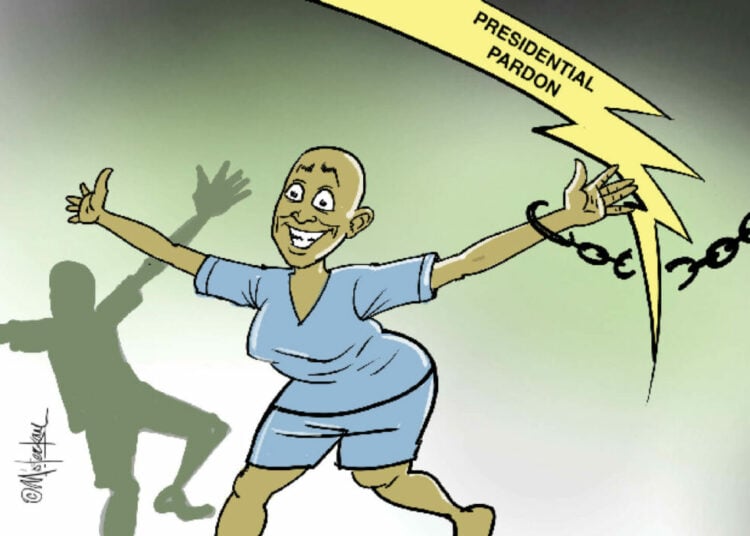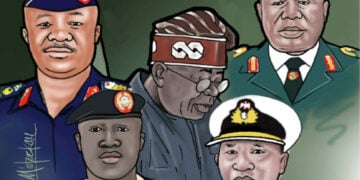Last week, in my column The Theatre of Presidential Pardon, I made a factual error. I had written that the case of Maryam Sanda, convicted of killing her husband, was still pending before the Supreme Court. A close friend later called to inform me that the case had been decided in 2023, with the apex court affirming her conviction and sentence. I acknowledge that oversight. However, every other argument I made in that piece — about the nature, timing, and philosophy of mercy in governance — remains valid.
It was therefore with interest, and a little amusement, that I read the piece by Mr. Tunde Rahman, Senior Special Assistant to the President on Media and Special Duties, published in Vanguard on October 19, 2025, under the title Much Ado About a Presidential Pardon. Mr. Rahman accused me of having “gone overboard” in my criticism of the presidential pardon and of proceeding “on a wrong premise.” He also alleged that I “lied that the pardon was granted before the final determination of the case.” That is a heavy word, “lied.” It suggests intent to deceive, which I reject absolutely. My error was factual, not moral, and has been corrected. But the greater debate — the wisdom, scope, and symbolism of clemency — still begs for reasoned conversation rather than reflex defense.
Mercy and Its Boundaries
Mr. Rahman is right about one thing: The 1999 Constitution gives the President the prerogative of mercy. No serious commentator disputes that. What Nigerians question is not the existence of the power but the discretion with which it was exercised. Law, as jurists remind us, was made for man, not man for law. And mercy, like law, must have proportion and prudence.
In both theology and jurisprudence, mercy is meant to perfect justice, not to extinguish it. Misericordia non tollit justitiam — mercy does not annul justice. When Abraham Lincoln pardoned deserters during the Civil War, he distinguished between fear and treason. When King Charles II granted amnesty after the Restoration, he withheld it from those whose crimes struck at the heart of the realm. Clemency has never meant indulgence; it has always demanded moral reasoning.
The recent Nigerian pardons, however, raise uneasy questions. By what ethical compass was this list drawn? Was repentance tested, or was mercy distributed wholesale — a bureaucratic benevolence wrapped in ceremony?
The Ethics of State Mercy
Mr. Rahman assures us that many beneficiaries have shown remorse, learned trades, or earned degrees in prison. That is admirable, but rehabilitation alone does not erase crimes that imperil society. A repentant arsonist cannot be released into a city still burning. The state’s first duty is protection; mercy cannot contradict safety.
Across civilised jurisdictions, the power of pardon is both moral and symbolic. Used wisely, it humanises authority; used casually, it trivialises justice. Presidents and monarchs have always known that clemency is not an act of generosity but of governance. In most democracies, pardon applications go through rigorous scrutiny — reviews by justice departments, public transparency, and a clear moral rationale.
In Nigeria, the process involved the Advisory Committee on the Prerogative of Mercy and the National Council of State, a distinguished assembly of current and past leaders. That is precisely why this outcome is so troubling. If such eminent minds could endorse mercy for those whose actions contributed to the nation’s trauma, what became of discernment? Was there no quiet voice at that table whispering, “Mr. President, this one may wound the public conscience”? We may never know, for the minutes of that meeting will remain sealed.
History’s Gentle Lessons
Mr. Rahman invokes examples from abroad: Clinton pardoning his brother, Biden his son, Trump his in-laws. He might have added that these very pardons became cautionary tales of excess. History, when read carefully, is a stern teacher. Andrew Johnson’s sweeping post-Civil War pardons almost shattered America’s fragile union. Louis XVI’s indulgence of corrupt nobles hastened his fall to the guillotine. Julius Caesar’s amnesties earned him daggers in the Senate. Even Mandela, whose forgiveness reshaped a nation, insisted that mercy must stand on truth; he forgave, but he never pretended.
Context is everything. Nigeria’s context is one of insecurity, poverty, and moral fatigue. Our citizens wake each day to news of abductions and killings; they live behind iron gates and whispered prayers. To announce a mass pardon including murderers, kidnappers, and drug traffickers in such an atmosphere feels like playing the violin while the city burns. Mercy must not outpace moral timing. Compassion is noble, but when poorly timed it can feel like betrayal.
It is easy for presidential aides to borrow examples from distant lands, but nations are not interchangeable templates. The social fabric of every country defines the weight of its laws. What America can pardon without fracture might tear the fragile seams of our own polity. The wisdom of governance is not in copying examples but in understanding context.
A Question of Conscience
Mr. Rahman insists that the list’s publication proves transparency. Yet openness without discernment is not transparency — it is simply exposure. A government may show the list to the public, but the people must see that principle, not politics, guided it. Power confers authority; conscience confers legitimacy.
The larger issue is not whether President Tinubu has the right to pardon but whether the exercise of that right strengthens public trust. A Republic can survive strong opposition; it cannot survive moral indifference. The challenge is not to prove legality but to demonstrate judgment. Law may authorise mercy, but leadership must justify it.
To be fair, no one doubts that the President may have acted from compassion. But compassion unguided by prudence becomes indulgence. The aides who frame and reframe this decision should realise that explaining away a moral misstep does not dignify the government; it diminishes it. A leader’s greatness lies not in the number of his pardons but in the restraint with which he grants them.
The Moral Geometry of Governance
Ultimately, mercy is not a weakness of justice, but its heart made visible. Yet for the state, that heart must beat within law’s ribcage. Section 175 grants the President discretion, but even constitutional powers must submit to reason and circumstance. To forgive murderers while their victims’ families still grieve, or to free arms dealers while soldiers face ambush, sends a message of moral confusion.
Nations do not collapse from lack of laws; they collapse when those laws lose moral credibility. The rule of law, like faith, is sustained by belief. When citizens begin to feel that justice can be undone by a signature, they lose faith in the system’s impartiality.
I write not to indict but to illuminate. The President’s “compassion” is not in question; the architecture of its expression is. If this episode teaches anything, it is that power without restraint breeds cynicism. In moments like this, the nation does not need cheerleaders; it needs custodians of conscience.
Mr. Rahman and his colleagues at the Villa should not take criticism as hostility but as civic participation — the trembling voice of a citizen reminding power that even kindness needs discipline. In the final measure, nations endure not by how many they forgive, but by how carefully they remember.





